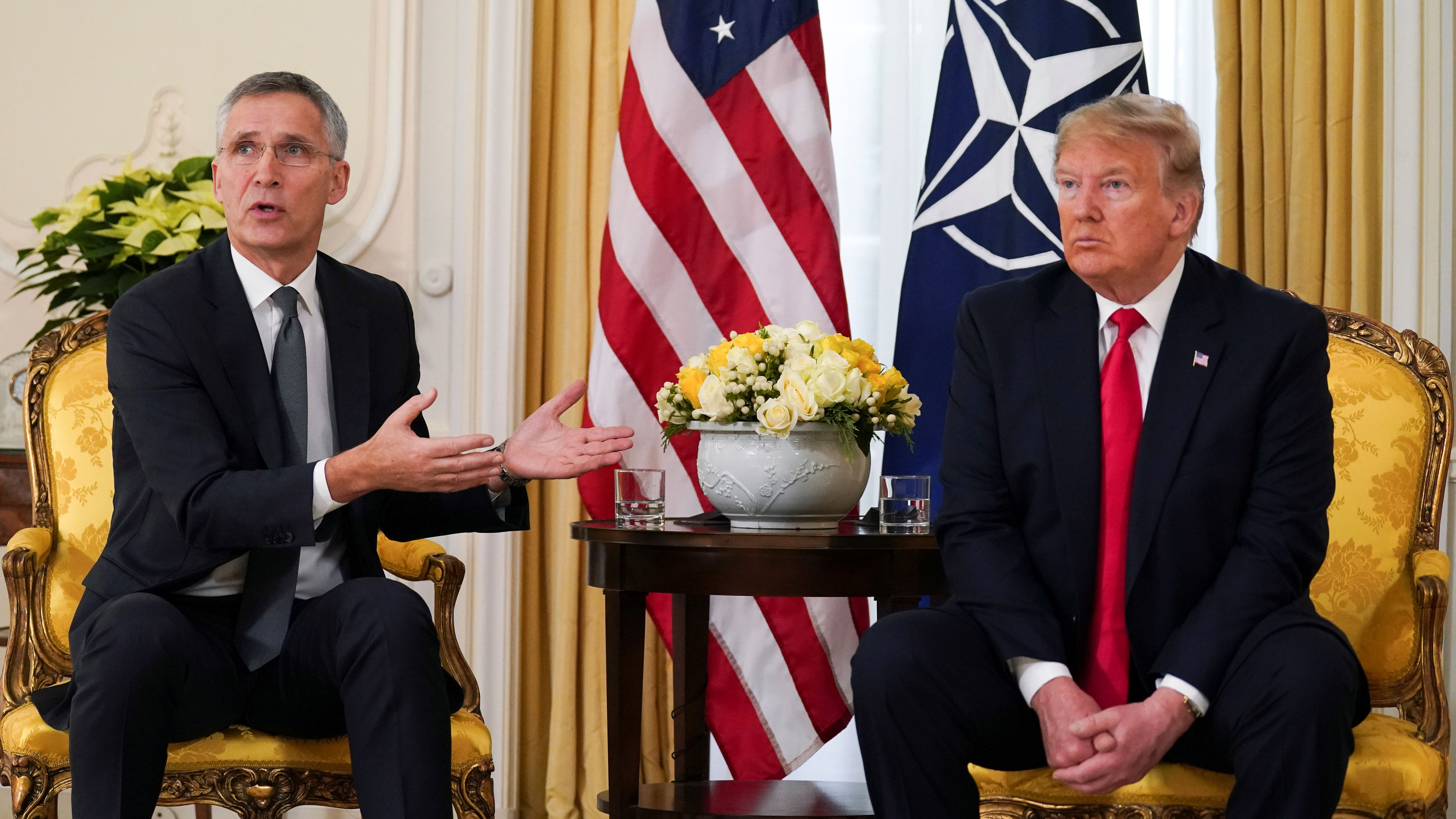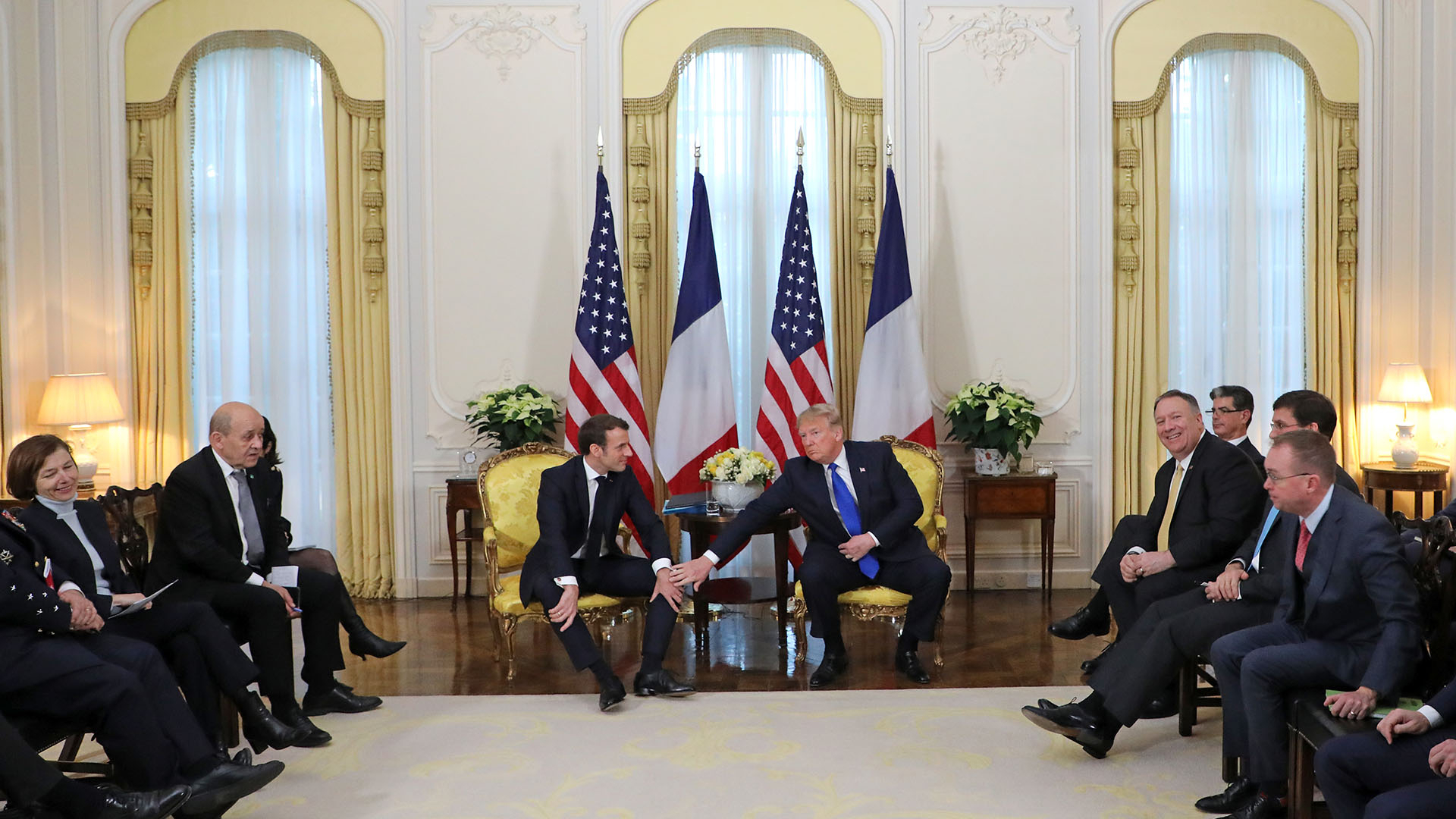
U.S. President Donald Trump (R) and NATO Secretary General Jens Stoltenberg confer ahead of the NATO summit in Watford, Britain, December 3, 2019. /Reuters Photo
U.S. President Donald Trump (R) and NATO Secretary General Jens Stoltenberg confer ahead of the NATO summit in Watford, Britain, December 3, 2019. /Reuters Photo
Editor's note: Freddie Reidy is a freelance writer based in London. He studied history and history of art at the University of Kent, specializing in Russian history and international politics. The article reflects the author's opinions, and not necessarily the views of CGTN.
In the U.S., Thanksgiving is often described as a time of the year for the family to reconvene, fall out, reconcile and agree to meet again on December 25 to do it all over again. This week's summit to celebrate the 70th anniversary of the founding of the North Atlantic Treaty Organization (NATO) certainly felt similar.
Ahead of the conference, clouds gathered as U.S. President Donald Trump kept up his criticism of Germany in particular for being "delinquent" in not honoring its 2 percent of GDP for defense spending, French President Emmanuel Macron alleged the alliance was "brain dead" and Chancellor Angela Merkel insisted the organization was as strong and relevant as ever.
In some ways it is puzzling that NATO is facing what, if unchecked, could develop into an existential crisis at a time where Russian hawkishness is at a peak and concerns over sovereign and digital security is critical.
Throughout the Cold War the mission for NATO was clear, though the collapse of the Soviet Union caused a revaluation of European economic and defense priorities to the dismay of the U.S. Today, only five nations maintain the target of 2 percent defense spending; the U.S., UK, Greece, Estonia and Poland. This deficit has fed much of the narrative that Trump has used on the campaign trail that NATO is "obsolete and disproportionally too expensive (and unfair) for the U.S."
That line of attack though is symptomatic of the other issues within the alliance that blighted the conference. Many leaders brought with them their own domestic baggage. For President Trump, the summit was an opportunity to project strength amidst impeachment hearings. President Macron is this week facing some of the largest industrial action since World War Two and so was keen to also appear statesmanlike and garner some hard to come by domestic support.
UK Prime Minister Boris Johnson was also keen to limit contact with President Trump so as not to play into the hands of his Labour Party election rival's spurious theories of being in the pocket of the U.S. This deprived Trump of key support among the group which is very much driven by U.S. money, manpower and political will and without which, little can be achieved.
Amid these fissures, a matriarch was needed, a master in diplomacy to unite the warring family, if only briefly. Who better to undertake such an unenviable task other than Her Majesty, Queen Elizabeth II?

U.S. President Donald Trump (centre R) and France's President Emmanuel Macron talk during their meeting at Winfield House, London, December 3, 2019. /AFP Photo
U.S. President Donald Trump (centre R) and France's President Emmanuel Macron talk during their meeting at Winfield House, London, December 3, 2019. /AFP Photo
For a short while, order was restored and family photos taken, only for the fleeting unity to be shattered the next day. Canadian media broadcast a video of President Macron, Prime Ministers Johnson and Trudeau and Princess Anne, The Princess Royal, involved in conversation where Macron and Trudeau appeared to mock President Trump and remark upon the apparent dismay of his aides at the president's conduct.
Temperatures continued to rise the following day in a Q&A session with Presidents Trump and Macron disagreeing on the origin of the greatest ISIL threat, with President Macron insisting it wasn't Europe as President Trump had suggested. Unhappy with Macron's denial, Trump pointedly remarked "This is why he's a great politician, because that was one of the greatest non-answers I've ever heard."
The battle of personalities certainly overshadowed the core narrative of the summit. Consensus had been achieved that the U.S. will reduce the percentage of its funding to NATO with a reduction to 16 percent of the total budget down from 22 percent with other NATO allies making up the shortfall. Other commitments from the alliance were to greater military readiness, a focus on integrity of security and telecommunications infrastructure, a substantial discussion on Russia and arms control.
Secretary General Jens Stoltenberg also announced that "for the first time, we addressed the rise of China – both the challenges and opportunities it poses and the implications for our security," adding that "we must find ways to encourage China to participate in arms control arrangements."
In a debate on future relevancy it is likely that there will be a great desire to enhance the group's strategic sphere to the Straits of Hormuz and beyond still further to the South China Sea in order to secure the interests of member states. It is certainly noteworthy though that this subject was not articulated as it would mean a radical divergence of mission. However, the organization was keen to stress that "as the world changes, NATO will continue to change." It seems hard to achieve this aim though without acknowledging the world's second largest economy.
With the meetings concluded, President Trump had time to rebuff Canadian Prime Minister Justin Trudeau's explanation for his actions, call him "two-faced" and head for Air Force One without staying for the customary press conference, joint declaration or any other further pleasantries. But, members did agree to meet again in 2021 and do it all over again.
(If you want to contribute and have specific expertise, please contact us at opinions@cgtn.com.)